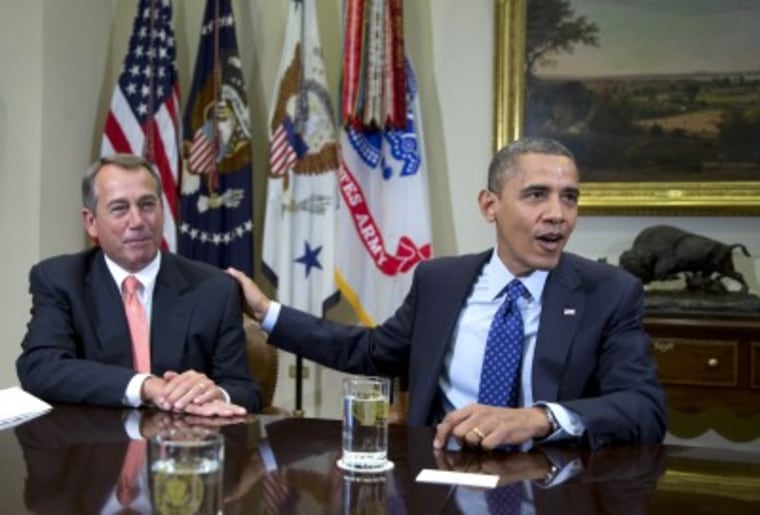This week the president signed the American Tax Relief Act, which restores Clinton era-tax rates for individuals with incomes above $400,000, extends unemployment insurance for a year, and postpones massive budgets two months, setting up yet another countdown towards yet another induced crisis.
Here, I think are the big lessons from the latest budgetary standoff between the White House and Congressional Republicans:
Lesson #1: The so-called fiscal cliff was not a cliff. We intentionally avoided the phrase fiscal cliff because it gave a totally false sense of what the actual deadline meant or policy. You cannot be a little off of a cliff, or kind of off a cliff, you are on a cliff or you at falling and then quickly dead and lifeless at the bottom of the valley. And the idea embedded in the metaphor was that if Congress and the president didn't come to an agreement before midnight on Dec. 31st, America would fall of the cliff.
And yet, what happened was that Congress blew through the deadline and instead of falling the nation just stayed suspended Wile E Coyote-like for a few days while the deal was finalized and voted on. In other words: the deadline wasn't a real deadline and blowing through it did not matter. And since that was the case it was incredibly unclear why the deal had to be passed through the lame duck 112th Congress rather than the more progressive 113th, which would convene just two days later.
Lesson #2 No one cares about the deficit. Okay, that might be slightly hyperbolic, but the core truth that emerged from this latest round of budget hi-jinks is that the people in Washington who most claim they care about the deficit don't actually. For instance all of these people...
House Speaker John Boehner: "A national debt that has gotten so out of hand it sparked a crisis without precedent in my lifetime or yours."Sen. John McCain: "Deficits that mortgage our children and our grandchildren's futures..."Rep. Paul Ryan: "We got to get this debt and deficit under control. We're not going to duck that issue ..."Sen. Joe Lieberman: "I will keep doing everything I can to keep our economy moving forward, and put our national debt under control."Sen. Joe Manchin: "If nothing changes, we'll have deficits for the next ten years, the next decade, no one can tell me that we can sustain that pace."
...all of these people voted for a deal that according to the analysis from the Congressional Budget Office adds $3.9 trillion to the deficit over the next decade.
I've said this before and I'll say it again until I'm hoarse, you cannot make any sense out of what politicians in Washington do if you actually take at face value that their stated concern with the U.S.'s debt. If you track the deficit reducing effect of each subsequent offer made by the White House, what you see is that as the White House negotiated with the Republicans--the party that runs around yelling about fiscal discipline and dire warnings that we are going to turn into Greece--as the White House negotiated with that party the amount of deficit reduction kept getting smaller, until it ended up at less than half of what was originally proposed. When politicians say the word "deficit," what they mean is something else entirely.
Lesson #3: Budget battles are about power not about ideology. The main narrative of this battle was of a ideologically extreme, Tea Party bound House Republican caucus forcing the country over the fiscal cliff and refusing to, in the words of Starbucks Cups "come together" to solve the country's problems. But look for a moment at the actual final deal that got passed and it's much harder to make out an ideological contour of it than it is to see the winners and losers have a lot to do with concentrated power.
So: 77% of American households will see their taxes go up because of the expiration of the payroll tax cut first proposed by Obama and passed last February. But this tax raise for the vast majority of wage-earners was basically a foregone conclusion the entire time, that rarest of things in Washington, a totally non-controversial. Even anti-tax zealot Grover Norquist shrugged it off:
"Obama was the guy who said that this was a tax holiday--calling it a tax holiday kind of suggests they viewed it as temporary. Holidays aren't permanent."
Now, you might say, well, the parties to this deal were trying to reduce the deficit and sunsetting the payroll tax cut saved $95 billion dollars. Well, yes, but then Congress turned around and passed a whole passel of so-called tax extenders--tax cuts, breaks, credits and incentives for a variety of industries and interests that will cost almost $68 billion dollars in this year alone. In other words congress saved money by allowing taxes of wage earners to go up and then took 72 percent of those savings and turned around and gave them away to -- among others, NASCAR to subsidize construction of race tracks, Hollywood to subsidize film production and, of course Wall Street, which maintained a massive $9.4 billion tax loophole called the active financing exception.
What's most revealing and fascinating is that in all the back and forth over the fiscal cliff and negotiations about the top marginal rates and chained CPI, these three aspects of the deal were never even debated, discussed or negotiated over. It was also a foregone conclusion. Wage earners were always going to pay more in taxes, while NASCAR and Goldman Sachs were always going to get their tax breaks.
In Washington, it's always the things not debated that are the most dangerous.
